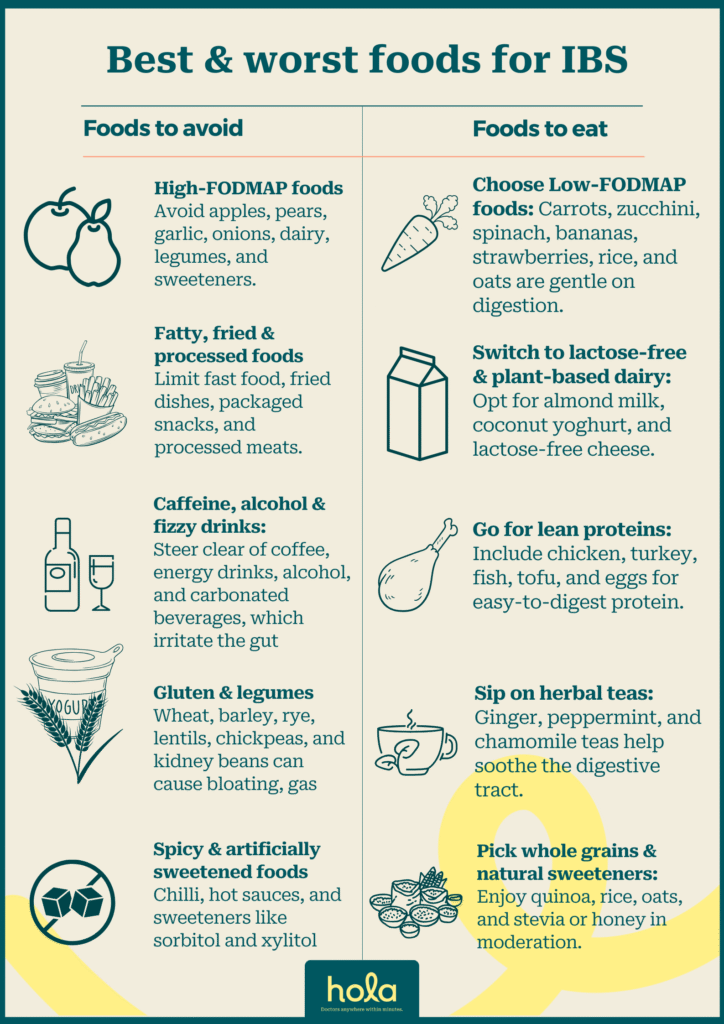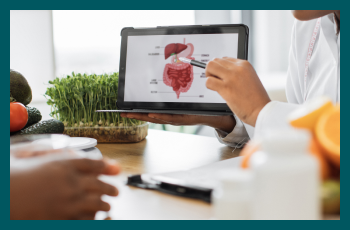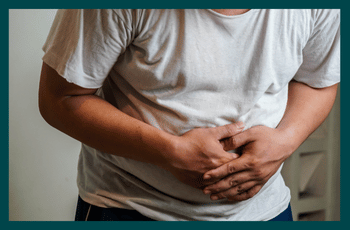Irritable Bowel Syndrome (IBS) symptoms: 12 foods to avoid
Written by the editorial staff writer at Hola. Medically Reviewed by Dr. Ammar AL-ANI, MBChB, CCBST, AMC.

Contents

Summary: Irritable Bowel Syndrome (IBS) is a common gastrointestinal disorder causing symptoms like abdominal pain, bloating, and irregular bowel movements. Managing IBS requires avoiding foods that aggravate symptoms, such as high-FODMAP foods, fatty foods, spicy foods, caffeine, and alcohol. A tailored diet plan under the guidance of a healthcare professional can help alleviate symptoms and improve daily comfort.
Irritable Bowel Syndrome (IBS) is a prevalent gastrointestinal disorder that affects the large intestine, causing a range of distressing symptoms. Around one in five Australians experiences the unpleasant symptoms of IBS at some point in their lives. These symptoms often include stomach pain, bloating, diarrhoea, constipation, or a mix of both. IBS is a chronic condition that requires ongoing management, and recognising the symptoms and triggers is essential for individuals coping with the disorder. Diet is a key aspect of management, as some foods may worsen IBS symptoms. Let’s examine the symptoms of IBS and highlight the foods to avoid for better management.
12 Foods to avoid if you have IBS
Diet plays a vital role in the management of IBS, as some foods may trigger or exacerbate symptoms. Here are some common foods to avoid if you have Irritable Bowel Syndrome.High-FODMAP foods:
FODMAPs (Fermentable Oligosaccharides, Disaccharides, Monosaccharides, and Polyols) are a group of short-chain carbohydrates that are inadequately absorbed in the small intestine. When they reach the colon, they undergo fermentation, which produces gas and draws water into the intestines. This process may result in bloating, diarrhoea, and abdominal discomfort. Common high-FODMAP foods that are problematic for IBS sufferers include:-
- Fruits: Pears, apples, watermelons, and dried fruits.
- Vegetables: Garlic, onions, cauliflower, artichokes, and broccoli.
- Dairy products: Milk, yoghurt, and soft cheese
- Legumes: Kidney beans, lentils, and chickpeas.
- Sweeteners: High fructose corn syrup, artificial sweeteners, and honey.
Dairy products (Milk, cheese, yoghurt):
- Many people with IBS are also lactose intolerant. Lactose, the sugar found in dairy, can cause gas, bloating, diarrhoea, and abdominal cramps when not properly digested.
- Better option: Lactose-free dairy or plant-based alternatives like almond milk, soy milk, or lactose-free yoghurt. These substitutes offer the same textures and nutrients without causing digestive issues from lactose.
Fatty foods (fast food, fried food, fatty meats):
- Fatty foods slow digestion, leading to feelings of heaviness, bloating, and discomfort. In some cases, they may also trigger diarrhoea in individuals suffering from IBS. A 2013 study found that 52% of people with IBS reported experiencing symptoms after consuming fatty or fried foods.
- Better option: Lean proteins like chicken, turkey, or fish, and cooking with healthier oils such as olive oil. These alternatives are gentler on the digestive system and support better digestion.
Caffeine (coffee, tea, energy drinks):
- Caffeine is a stimulant that can irritate the digestive system, leading to more frequent bowel movements and triggering diarrhoea in IBS-D (Irritable Bowel Syndrome with diarrhoea) individuals. It may also intensify anxiety, further worsening IBS symptoms.
- Better option: Herbal teas like chamomile, peppermint, or ginger. These are comforting for the digestive tract and provide a sense of calm without the stimulating effects of caffeine.
Spicy foods (chilli, spicy dishes, hot sauces):
- Spicy foods can irritate the gut lining, causing discomfort, gas, and aggravating symptoms like heartburn or diarrhoea in susceptible individuals.
- Better option: Mild seasonings such as oregano, parsley, or basil. These enhance the taste without the risk of irritation and are easy on the stomach.
Legumes (lentils, chickpeas, kidney beans):
- Legumes contain specific carbohydrates that are difficult to break down and may cause bloating, excessive gas, and discomfort when fermented in the colon.
- Better option: Vegetables that are thoroughly cooked, like bell peppers, spinach, zucchini, or moderate amounts of low-FODMAP legumes like canned lentils or chickpeas. Soaking and cooking beans properly can help minimise their effect on digestion.
Processed foods (ready-to-eat meals, packaged snacks):
- Many packaged foods are rich in preservatives, artificial sweeteners, and unhealthy fats that may irritate the gut and trigger IBS symptoms.
- Better option: Fresh, unprocessed foods like grilled vegetables, lean proteins, and home-cooked meals. These provide essential nutrients, are preservative-free, and are easier for the body to digest.
Gluten (wheat, barley, rye):
- While gluten doesn’t affect everyone with IBS, it may exacerbate symptoms in individuals with gluten intolerance or coeliac disease. Gluten can cause bloating, abdominal pain, and inconsistent bowel movements. Research suggests that people with IBS are more likely to be sensitive to gluten.
- Better option: Gluten-free grains like quinoa, rice, and oats. These offer a gluten-free option for gluten-sensitive individuals, providing fibre and vital nutrients.
Artificial sweeteners (sorbitol, mannitol, xylitol):
- These artificial sweeteners may cause bloating, diarrhoea, and gut discomfort due to poor absorption and fermentation in the colon.
- Better option: Natural sweeteners like stevia or limited amounts of honey. These are milder on the stomach and do not cause the same discomfort.
Onion and garlic:
- Onion and garlic are rich in FODMAPs, which can ferment in the digestive tract, leading to gas, bloating, and abdominal pain.
- Better choice: Infused oils such as garlic-infused olive oil or chives and green onions. These provide a similar flavour without triggering digestive issues.
Carbonated beverages (soda, fizzy water):
- The carbonation in sparkling drinks can cause bloating, gas, and a feeling of heaviness by trapping air in the digestive system.
- Better choice: Non-carbonated options like still water, herbal teas, or naturally flavoured water. These avoid bloating and are easier on the digestive system.
Alcohol:
- Alcohol can inflame the digestive tract, cause inflammation, affect gut movement, and lead to issues like diarrhoea, bloating, and stomach discomfort.
- Better choice: Non-alcoholic drinks such as lemon-infused water or herbal teas. These offer hydration and refreshment without causing IBS flare-ups.
Also read: How to relieve IBS pain instantly: Doctor’s guide
Feeling sick and unsure why? Speak with a GP online in 15 minutes.
What to eat instead?
For managing IBS, here are some foods to consider:- Low-FODMAP foods: These foods are gentler on the digestive system and are less likely to cause discomfort and bloating. Examples include:
- Carrots, spinach, zucchini
- Bananas, strawberries, oranges
- Rice, oats
- Plant-based milk or lactose-free dairy
- Lactose-free options: If you are lactose intolerant, try:
- Almond milk, soy milk, or coconut yoghurt
- Lactose-free cheese, yoghurt, and milk
- Lean proteins:
- Chicken, turkey, fish
- Eggs or egg whites
- Tofu or tempeh
- Herbal teas
- Ginger tea
- Peppermint tea
- Chamomile tea
- Whole grains:
- Rice, quinoa, oats
- Polenta, buckwheat
- Natural sweeteners
- Stevia, monk fruit, or small amounts of honey
- Coconut sugar
- Cooked vegetables:
- Well-cooked broccoli or cauliflower in limited quantity
- Zucchini, spinach, carrots, bell peppers

What foods make IBS symptoms worse?
Certain foods can aggravate IBS symptoms, but triggers differ from person to person. Common food items include:- High-FODMAP foods: FODMAPs (fermentable oligosaccharides, disaccharides, monosaccharides, and polyols) are carbohydrates that are not easily absorbed, potentially leading to bloating, gas, and diarrhoea. Foods that are high in FODMAPs include:
- Dairy items (milk, soft cheese, ice cream, yoghurt)
- Certain fruits (apples, pears, cherries, watermelon, peaches, mangoes)
- Certain vegetables (onions, garlic, cauliflower, brussels sprouts, asparagus)
- Legumes (beans, lentils, chickpeas, soy products)
- Wheat-based products (bread, pasta, cereals)
- Fatty and fried foods
- Foods that are deep-fried, such as French fries, fried chicken, and chips
- High-fat dairy products like heavy cream, butter, and full-fat cheese
- Fatty cuts of meat
- Caffeinated and carbonated beverages
- Coffee, tea, and energy drinks can stimulate the gut and may lead to diarrhoea
- Soda and sparkling water can cause gas and bloating
- Alcohol: Beer, wine, and spirits can irritate the digestive system and lead to dehydration, worsening constipation or diarrhoea.
- Artificial sweeteners and sugar alcohols: Sorbitol, xylitol, and maltitol (found in sugar-free snacks, candies, and diet sodas) can result in bloating and diarrhoea.
- Spicy foods: Hot peppers, chili sauce, and heavily seasoned dishes may irritate the digestive tract and trigger symptoms.
- Gluten (for some individuals): Wheat, barley, and rye may cause issues for those with gluten sensitivity, leading to bloating and discomfort.
Also read: Bloating, pain, and gas: When to talk to a GP
What triggers IBS flare-ups?
Various factors, such as dietary choices, stress, and lifestyle habits, can trigger IBS flare-ups. Common triggers include:
- Certain foods: Numerous individuals with IBS are sensitive to particular foods, including:
-
- High-FODMAP choices (onions, garlic, beans, dairy, wheat, apples, pears)
- Fatty and fried items (fast food, heavy cream, butter)
- Spicy foods (hot peppers, chili sauce)
- Artificial sweeteners (sorbitol, xylitol, found in sugar-free gum and diet sodas)
- Carbonated drinks (soda, sparkling water)
- Caffeine and alcohol (coffee, energy beverages, beer, wine)
- Stress and anxiety: Emotional stress can impact gut function directly, leading to cramping, bloating, and alterations in bowel habits.
- Hormonal fluctuations: Numerous women encounter IBS flare-ups linked to their menstrual cycle due to hormonal changes.
- Irregular eating habits: Skipping meals, overeating, or consuming food too quickly can hinder digestion and trigger symptoms.
- Sedentary lifestyle: A lack of physical activity can impede digestion and exacerbate symptoms, particularly constipation.
- Alterations in gut bacteria: Changes in gut microbiota, often resulting from antibiotics or infections, can instigate IBS symptoms.
- Insufficient sleep: Poor sleep can heighten gut sensitivity and stress, resulting in flare-ups.
A mix of dietary habits, stress, hormonal fluctuations, irregular eating patterns, and insufficient sleep can trigger IBS flare-ups. Managing IBS entails identifying personal triggers and making lifestyle modifications, including maintaining a consistent diet, managing stress levels, and engaging in physical activity. By adopting healthy habits, people may reduce the frequency and severity of IBS symptoms.
Can you drink coffee if you have IBS?
Whether coffee is suitable for individuals with IBS depends on personal tolerance. Caffeine found in coffee can stimulate the digestive system, which may result in symptoms such as diarrhoea, bloating, or acid reflux. It can also exacerbate anxiety, which is a frequent IBS trigger. Some people can handle coffee in moderation, while others avoid coffee. Here are some tips for consuming coffee with IBS:
- Limit consumption to a single ounce daily and monitor any reactions.
- Opt for low-acid options like cold brew or decaf.
- Enjoy coffee with food to minimise irritation.
- Avoid high-FODMAP additions like regular milk.
If coffee worsens symptoms, consider cutting back or eliminating it. If it is well tolerated, enjoy it in moderation with gut-friendly selections.
Is a banana good for IBS?
Bananas may benefit those with IBS, but their impact varies based on ripeness and personal tolerance. They are easy to digest, high in soluble fibre, and have prebiotics that promote gut health. However, unripe (green) bananas contain significant amounts of resistant starch, which can lead to bloating and gas, whereas ripe (yellow) bananas are easier to digest and typically more suited for individuals with IBS, particularly those experiencing constipation. Nevertheless, some individuals may still feel discomfort, so it’s recommended to gauge your tolerance and consume them in moderation.
Other tips for managing IBS symptoms
Managing IBS symptoms requires changes in diet, lifestyle modifications, and stress management. Here are some effective strategies:
- Adhere to a low-FODMAP diet: Steer clear of high-FODMAP items such as onions, garlic, beans, and certain dairy products.
- Consume smaller, more frequent meals: Large portions can overload the digestive system and trigger symptoms.
- Maintain hydration: Drink ample water to support digestion and avoid constipation.
- Restrict caffeine, alcohol, and fizzy drinks: These can irritate the digestive system and exacerbate symptoms.
- Engage in regular physical activity: Exercise encourages digestion and alleviates stress.
- Address stress: Utilise relaxation methods such as meditation, yoga, or deep breathing exercises.
- Ensure adequate sleep: Insufficient rest can worsen IBS symptoms.
- Keep a food journal: Documenting foods and symptoms can help pinpoint personal triggers.
Effectively managing IBS necessitates dietary changes, stress control, and healthy lifestyle practices. Identifying your triggers, drinking plenty of water, eating a balanced diet, and maintaining a consistent routine can help alleviate symptoms and improve gut health.
When to call the doctor?
You should consult a doctor if IBS symptoms become severe, change suddenly, or disrupt daily activities. Seek medical assistance if you experience unexplained weight loss, ongoing pain, severe bloating, or blood in your stool. Additionally, consult a doctor if ongoing diarrhoea or constipation persists despite dietary adjustments. If symptoms develop after age 50, worsen over time, or are accompanied by fever, vomiting, or trouble swallowing, medical evaluation is necessary. A healthcare professional can offer guidance, conduct tests, and suggest treatments to manage symptoms effectively.
How can an online GP help?
An online GP can assist in managing IBS by offering medical advice, prescriptions, and lifestyle tips from the ease of your home. They can:
- Evaluate symptoms: Analyse your condition and eliminate the possibility of other digestive issues.
- Advise dietary modifications: Guide low-FODMAP diets and foods to avoid.
- Prescribe medications: Offer solutions for pain, diarrhoea, or constipation.
- Suggest stress reduction methods: Suggest relaxation methods to help reduce flare-ups.
- Conduct tests: Organise stool tests, blood tests, or referrals if necessary.
- Track progress: Conduct follow-ups to monitor symptom improvement.
Online GPs deliver prompt, convenient, and professional support, helping you handle IBS without needing in-person appointments.
In conclusion, while IBS can be difficult to manage, identifying and avoiding trigger foods is a key strategy in controlling its symptoms. High-FODMAP foods, alcohol, caffeine, fatty or greasy foods, spicy foods, and carbonated drinks are common culprits. Since IBS triggers differ for each individual, working with a healthcare professional to develop a personalised diet plan can significantly improve symptoms and overall well-being.
- High-FODMAP choices (onions, garlic, beans, dairy, wheat, apples, pears)
- Fatty and fried items (fast food, heavy cream, butter)
- Spicy foods (hot peppers, chili sauce)
- Artificial sweeteners (sorbitol, xylitol, found in sugar-free gum and diet sodas)
- Carbonated drinks (soda, sparkling water)
- Caffeine and alcohol (coffee, energy beverages, beer, wine)
Reference
- Irritable Bowel Syndrome - reference link
- National Library of Medicine - reference link
- National Library of Medicine - reference link
- National Library of Medicine - reference link
What we treat
- Cough
- Nausea & vomiting
- Fever
- Hayfever
- Fatigue
- Sore throat
- Acne
- Hair loss
- Gout
- Eczema
- Rosacea
- Sunburn
- UTI
- Erectile dysfunction
- Contraception
- Morning sickness
- Morning after pill
- Prostate health
- Anxiety
- Depression
- Stress
- Grief & loss
- Antidepressants
- Premature ejaculation
- Asthma
- Blood pressure
- Blood thinners
- Diabetes
- Cholesterol
- Migraines & headaches
- Allergies
- Body ache
- Heartburn & reflux
- Sleep disorder
- Pain relief
- Gastro
Related Articles
Disclaimer
This blog is for general informational purposes only and does not indicate that Hola Health provides all treatments or preventive measures mentioned. It is not intended to be a substitute for professional medical advice. Always seek the guidance of your doctor or other qualified health professional with any questions you may have regarding your health or a medical condition. For emergencies please immediately contact 000. Any medical topics discussed are intended to educate, not to imply availability through Hola Health.

Get affordable healthcare on your terms, with quick access to qualified, Australian-registered telehealth doctors & health practitioners, 24/7, 365 days a year. No more searching for ‘doctors near me‘ – Hola connects you instantly.
Address: 79 St Georges Terrace, Perth WA 6000


Hola Health App
Get affordable healthcare on your terms, with quick access to qualified, Australian-registered telehealth doctors & health practitioners, 24/7, 365 days a year. No more searching for ‘doctors near me‘ – Hola connects you instantly.
Call 000 for emergency or urgent medical help.
Address: 79 St Georges Terrace, Perth WA 6000
© Hola Health, a brand of Packapill Pvt Ltd


 Facebook
Facebook  X
X  Copy Link
Copy Link











